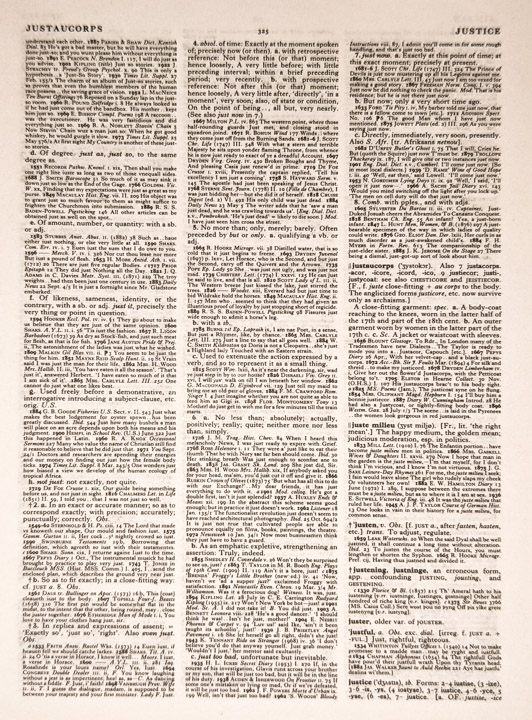
Sometimes it’s wrong to begin a phrase with the word “just”. I offer as evidence two such situations. I think there’s a common thread to be drawn.
Stuck · People with mental-health issues can get stuck. For example, when some combination of depression and anxiety means they can’t get out of bed all day, and can’t say why. Or when they really need to get dressed or packed or organized for some imminent un-reschedulable event, and can’t get started.
It would be easy to — sorry, it is easy, I know this because I have — say something like “Just stand up and look out the window, it’s sunny.” Or “Just grab some random underwear and drop them in the suitcase, then you’ll be started”. Or “Just get the binder out of your knapsack and look at the first page.”
This. Will. Not. Help.
Broken · Suppose a colleague at work who takes care of an important high-volume Web Service is dealing with a horrible problem: Spiking latencies, or an actual outage. They’re not making good progress, and someone’s asked you if you can help. You look at some graphs and error messages. It’s easy (once again, I speak from experience) to say something like “Could you just cache the hot partition keys?” or “So, just scan the logs for the high-latency signals and frequency-sort them.”
This. Will. Not. Help.
Philology · Pardon this sidebar; I’ve got a history with dictionaries. And, we have lots of ’em within pretty easy reach of where I’m sitting to write this. I was curious about this usage of “just” in a sense which sort of means “merely”, diminishing the difficulty of whatever action is being proposed.
So I grabbed the Shorter OED (4th ed.), which is a lot easier on the wrists and eyes than the full OED and which, cognoscenti will tell you, is maybe a little stronger on etymology than its larger sibling. Disappointingly, I turned up nothing. So I went and took out the Compact Oxford English Dictionary. Note: This is not the Compact Oxford Dictionary, it’s a 1989 printing of the then-new full Second Edition of the OED, photographically reduced with nine pages on each of its (very large) leaves. Which means it strains the wrist and you need a magnifying glass to read the text.
Wondering why I care? I helped produce these artifacts. Must write about that someday… anyhow.
In the big OED I struck gold. Which surprised me since I have always thought that the Shorter is enough to suffice anyone who’s not trying to figure out what Chaucer meant or when Indian vocabulary begin to infuse into English. In fact, this is the first time in decades that I’ve actually needed to go to the big OED.
Below I reproduce the relevant page. Warning: If you enlarge this you’ll get the full-resolution picture, and it’s not small. The page starts halfway through the adverbial senses of “just”.
There, we learn (see sense 5) of the usage which means “No more than; merely; barely”. The first supporting quotation is from Robert Hooke in 1665, but my favorite is from Macaulay in 1849: “Men who … seemed to think they had given an illustrious proof of loyalty by just stopping short of regicide.”
But let’s not ignore sense 5.c: “Used to extenuate the action expressed by a verb, and so to represent it as a small thing.” The first known usage from by Walter Scott in 1815. The most recent quotation is from 1898 and resonates with me: “Mother! Do just get in with me for a few minutes till the train starts.” I wonder why Mother wouldn’t get in, and I’m pretty sure that “just” didn’t help.
Take-away · Do not, to quote the OED, “represent as a small thing” the difficulty of something you’re asking someone else to do, when you’re not inside their head and don’t understand what they see and feel. The word “just” is a signal that you’re not taking their problem seriously.
So, don’t do that.
I’d like to say “Just don’t” but obviously shouldn’t.
By .
The opinions expressed here
are my own, and no other party
necessarily agrees with them.
A full disclosure of my
professional interests is
on the author page.
如有侵权请联系:admin#unsafe.sh
